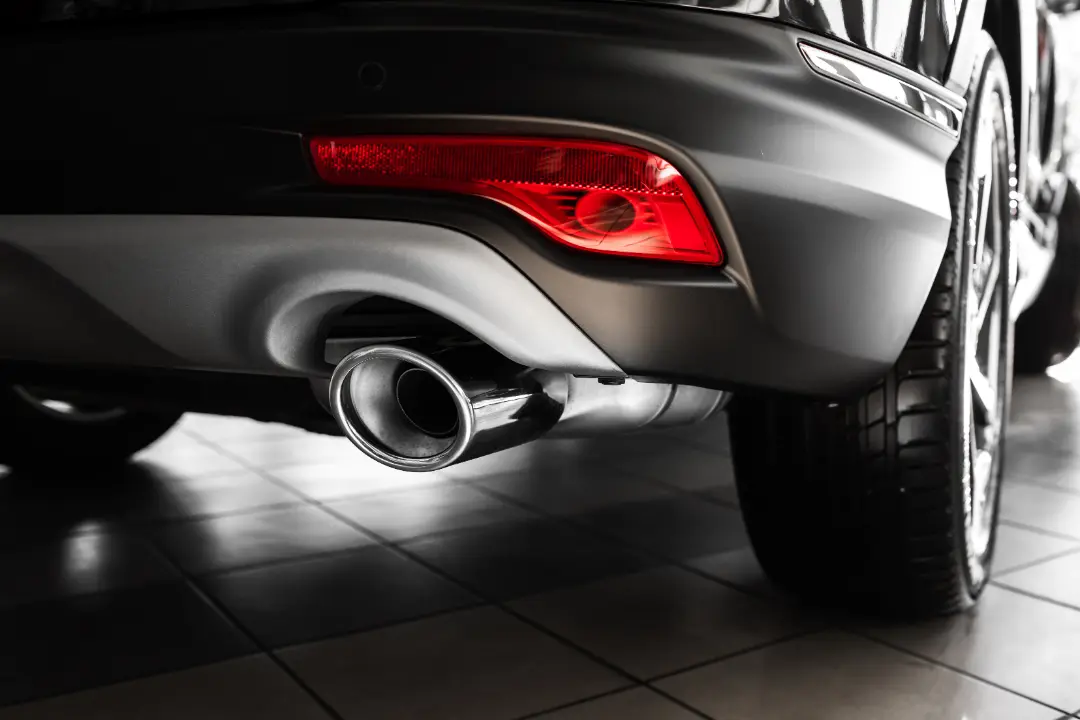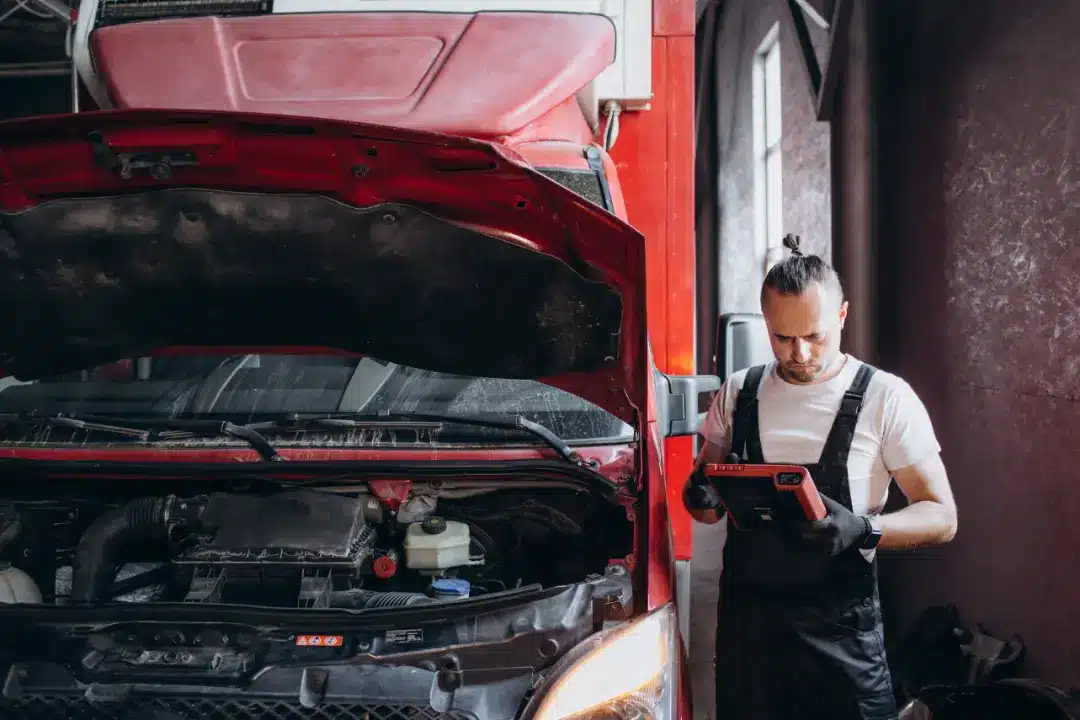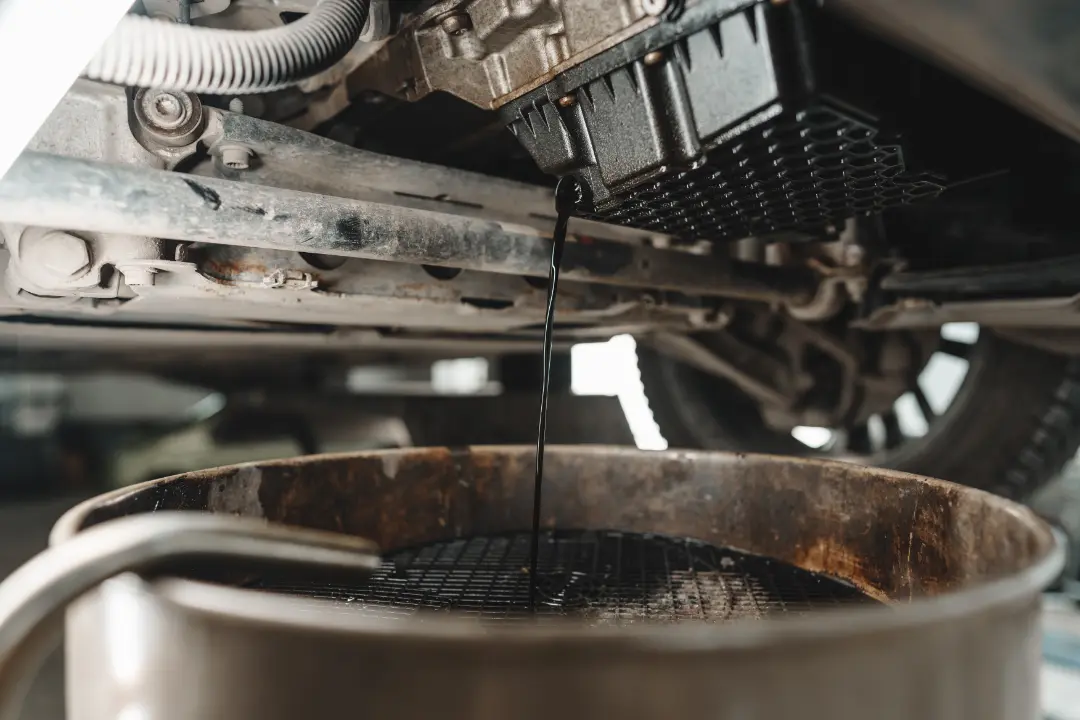How often should you replace your car brakes? Typically, brake pads need replacing every 20,000 to 70,000 miles, and brake discs every 60,000 to 100,000 miles. This article will discuss how driving habits, vehicle load, and warning signs affect brake wear.
Key Takeaways
- Brake pads generally need replacement every 25,000 to 65,000 miles, depending on driving habits and brake pad type. Regular inspections are suggested twice a year or every 10,000 miles.
- Squealing or screeching noises, grinding sounds, and longer stopping distances are indications that brake pads need replacement; addressing these signs promptly can prevent more severe damage and expensive repairs.
- Brake discs typically last between 25,000 and 80,000 miles, and signs of wear include unusual vibrations and the car pulling to one side. Regular inspections ensure optimal braking performance and safety.
Understanding Brake Components and Their Lifespan
Your car’s braking system, including car brakes, is a complex assembly of parts working together to bring your vehicle to a halt. The main components include disc and drum brakes, each critical in stopping your car. Vehicle brake pads and brake discs are integral to both types, with pads typically lasting between 20,000 to 40,000 miles.
Ceramic brake pads, known for their durability, can last even longer. However, brake pads are softer than brake discs and wear down faster, necessitating regular checks.
Brake discs, on the other hand, generally have a lifespan ranging from 25,000 to 80,000 miles, heavily influenced by driving habits and maintenance. Aggressive braking and carrying heavy loads can significantly shorten their lifespan. For effective braking performance and road safety, inspecting these components and promptly replacing the worn parts regularly is advisable.
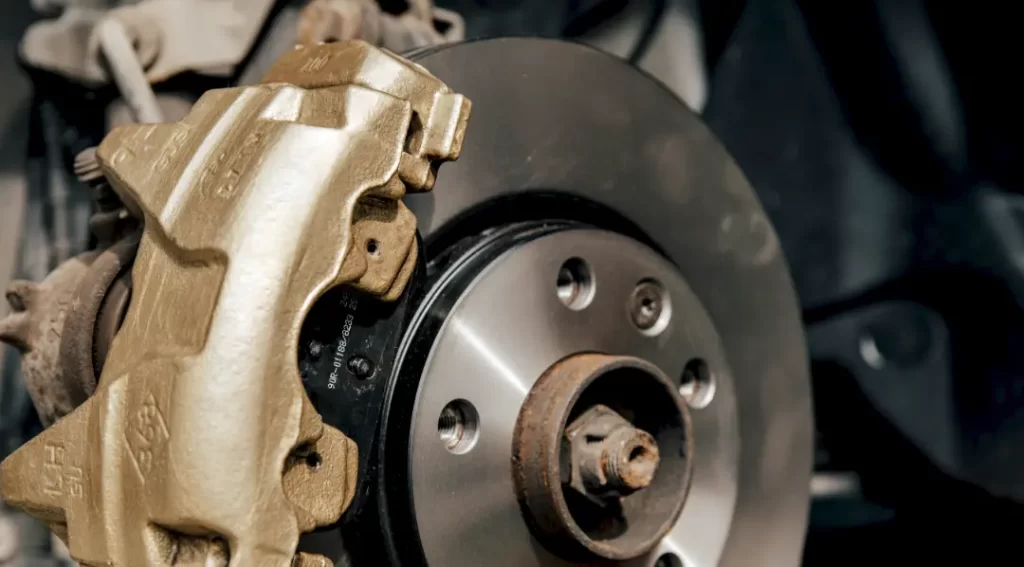
How Often Should You Replace Brake Pads?
Brake pads are the workhorses of your braking system, enduring significant friction and heat. They typically need replacement every 20,000 to 70,000 miles, depending on factors like driving habits and the type of brake pad used.
For instance, city driving with frequent stop-and-go traffic can wear out brake pads faster, while highway driving tends to be less taxing. General recommendations suggest replacing brake pads between 25,000 to 65,000 miles.
Keeping your brake pads in good condition requires regular inspections. You should check your brake pads at least twice a year, or you can check them every 10,000 miles. This proactive approach helps identify wear before it becomes a safety issue, allowing you to replace the brake pads in a timely manner and avoid more significant brake system problems.
Signs It’s Time to Replace Your Brake Pads
Safety and prevention of costly repairs hinge on the timely recognition of worn brake pads’ signs. Common indicators include squealing or screeching noises, grinding sounds, and longer stopping distances. These warning signs suggest that your brake pads need immediate attention to maintain effective braking performance and avoid damaging other braking components.
Squealing or Screeching Noises
One of the most common signs of worn brake pads is a persistent squealing or screeching noise when you apply the brakes. This sound often indicates that the brake pads are excessively worn down and need replacement. Some brake pads are designed with built-in wear indicators that emit this noise to signal that it’s time for a replacement. Other signs of worn brake pads include:
- Reduced braking performance
- Longer stopping distances
- Vibrations or pulsations in the brake pedal
- Dashboard warning light indicating brake pad wear
If you notice any of these signs, it’s essential to have your brake pads inspected and replaced to ensure your safety on the road.
Hearing squealing or screeching across all weather conditions signals the need for a brake pad inspection. Ignoring these sounds can lead to more severe brake issues, including rotor damage, which can be costly.
Grinding Noise When Braking
A grinding noise when braking is a serious indication that your brake pads are completely worn down. This sound occurs when the calliper directly touches the rotor, causing significant damage. When you hear a deep, low noise like metal grinding or a rumbling growl, it likely indicates that the brake pads have worn away. This situation can lead to the following issues:
- The backing plates making contact with the discs or drums
- Reduced braking performance
- Increased stopping distance
- Potential damage to the rotors or drums
If you hear this grinding noise, it is important to have your brake pads replaced as soon as possible to ensure your safety on the road.
If you hear a grinding noise when applying pressure to the brake pedal, seek immediate attention. Continuing to drive with worn brake pads can severely damage the rotors, leading to expensive repairs and compromised braking performance.
Longer Stopping Distances
Worn brake pads can significantly reduce braking efficiency, leading to longer stopping distances. If you notice that your car takes longer to stop or isn’t as responsive when you apply the brakes, it’s a clear sign that your brake pads or rotors may be worn and need replacement. To ensure your safety on the road, changing brake pads when they show signs of wear and installing new ones is important.
Effective braking is vital for vehicle safety, facilitating prompt stops and responding to varying driving conditions.
How Often Should You Replace Brake Discs?
Brake discs, also known as rotors, typically need replacement every 60,000 to 100,000 miles, depending on your driving style and whether they are front or rear discs. Well-maintained brake discs can last up to 80,000 miles, but poorly maintained ones might need replacement as early as 25,000 to 30,000 miles. Aggressive braking increases the strain on brake discs, reducing their lifespan.
Regular monitoring of your brake discs’ condition is paramount. Deep grooves, cracks, or structural problems in the disc indicate that it’s time for a replacement. Regular inspections can help identify these issues early, ensuring optimal braking performance and safety on the road.
Symptoms Indicating Worn Brake Discs
Worn brake discs can manifest through various symptoms, including unusual braking vibrations and the car pulling to one side.
Addressing these symptoms is pivotal in preventing further damage and maintaining safe driving conditions.
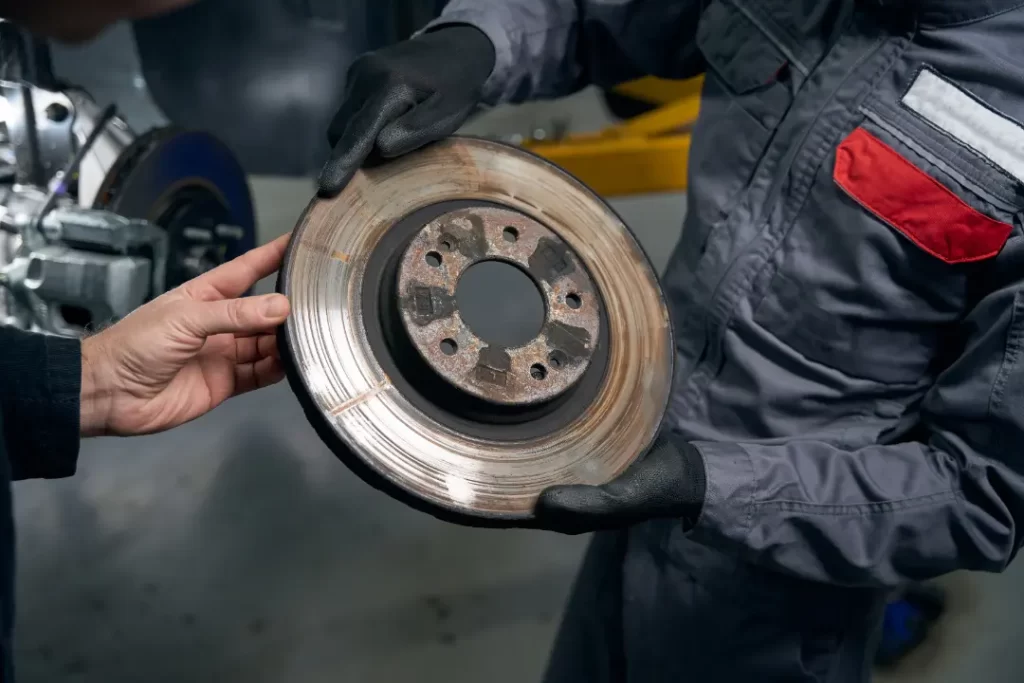
Unusual Vibrations When Braking
Excessive vibrations when braking can indicate that your brake discs are not smooth or are possibly cracked. Warped brake discs can cause noticeable vibrations through the brake pedal, signalling they need to be inspected and possibly replaced. Damaged rotors can also cause this issue, leading to uneven braking performance.
Perceiving vibrations when braking necessitates a professional check of your brake system. Unevenly working brakes due to not smooth rotors can cause shaking when you press the brake pedal, compromising your vehicle’s safety.
Car Pulls to One Side
Suppose your car pulls to one side when braking; it often indicates uneven wear to the brakes or a sticking calliper. This issue can be dangerous, affecting the vehicle’s stability and control. Uneven brake disc wear can cause the car to pull to one side when braking.
Regular brake inspections can help identify issues like uneven pad wear that can lead to this problem. Addressing these issues early ensures that your vehicle remains safe and responsive on the road.
The Role of Brake Fluid in Braking Performance
Brake fluid is a vital component of your braking system. It amplifies the force applied on the brake pedal and converts it into pressure within the system. For brake fluid to be effective, it must maintain a constant viscosity across a wide temperature range. Regularly checking brake fluid levels and replacing it approximately every two years can prevent brake failure.
Brake fluid is hygroscopic, meaning it absorbs moisture from the air, which can reduce its effectiveness over time. Contaminated brake fluid can cause corrosion and debris build-up, disrupting brake performance. Maintaining brake fluid in good condition is essential for optimal braking performance and overall vehicle safety.
Factors Affecting Brake Wear
Several factors influence the wear and tear of your brake components, including driving conditions, vehicle load, and weather. Urban driving with frequent stops and heavy loads can accelerate brake pads and friction material wear, necessitating more frequent replacements.
Understanding these factors can help you adopt better driving habits and maintain your brakes more effectively.
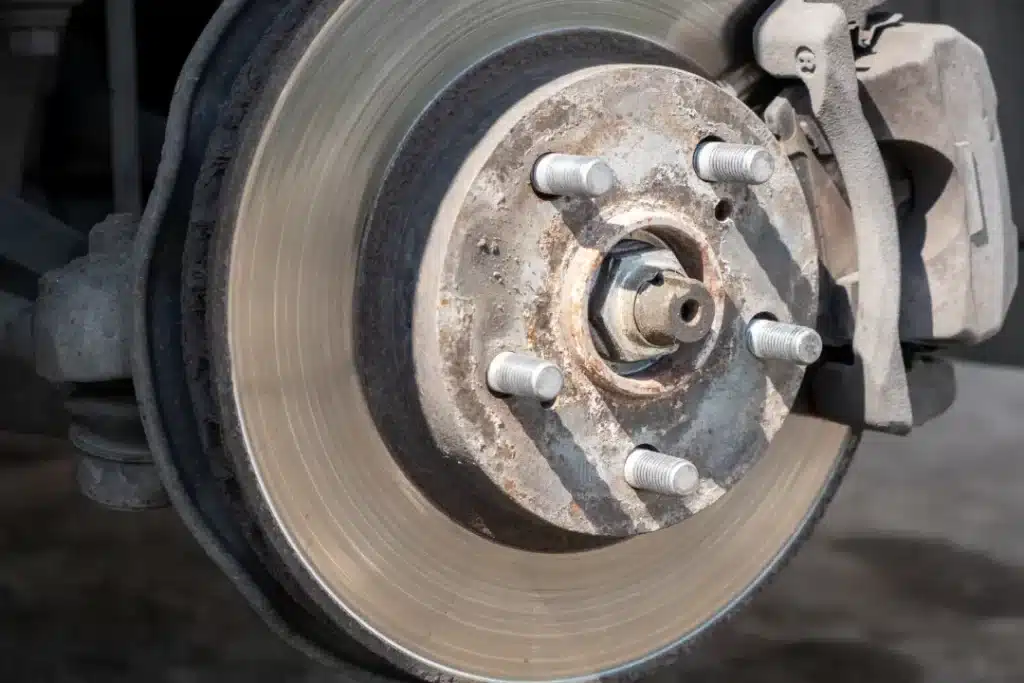
Urban vs. Highway Driving
Driving in urban, stop-and-go environments causes brake pads to wear out faster than on highways. City driving involves constant acceleration and deceleration, putting more strain on the brakes. Frequent short-distance driving with heavy braking can reduce the lifespan of brake discs.
In contrast, highway driving typically results in less brake wear because it involves fewer stops and more steady speeds. Motorway driving is less taxing on brake discs than inner-city driving due to less frequent braking. Adapting your driving habits based on your environment can help prolong the life of your brake components.
Weather Conditions
Weather conditions like high humidity and cold temperatures can affect brake performance and wear. High humidity and wet conditions can contribute to brake rotor rust and reduce brake pad effectiveness. Cold weather can cause brake pads and rotors to contract, potentially affecting braking performance.
Adjusting your driving and maintenance habits according to weather conditions is essential for optimal brake performance.
Maintaining Your Brakes for Optimal Performance
Regular inspections and maintenance are necessary for optimal brake performance and longevity. Addressing braking issues early can prevent costly repairs and ensure your vehicle remains safe to drive.
Sovereign Motor Engineers offers various car services, including brake maintenance, to help you keep your braking system in top condition.
Regular Inspections
Regular brake inspections are required to keep the entire braking system in good working order. Inspecting your car’s brakes at least once a year to detect wear and tear early is advisable. Motorists driving around 8,000 miles or more yearly should have their braking systems assessed twice yearly, especially before long journeys and MOTs.
Inspecting the thickness of brake pads during tyre rotations is an excellent preventive measure, and it’s essential to have your brake pads checked regularly. Regular inspections can detect issues like brake fluid leaks, worn-out brake pads, or damaged rotors, helping you avoid costly repairs and ensure optimal braking performance.
Listening for Warning Signs
Consider warning signs like noises and dashboard lights to avoid costly repairs and accidents. If the brake warning light comes on, have a brake expert diagnose the issues.
A proactive approach to these signs guarantees the safety and reliability of your vehicle on the road.
Sovereign Motor Engineers: Your Go-To for Expert Brake Services
Sovereign Motor Engineers is your trusted partner for expert brake services. With over 10 years of experience and a team of qualified technicians, they offer comprehensive brake checks, quality repairs, and replacements.
Known for their excellent customer service, honesty, and efficiency, Sovereign Motor Engineers ensures your vehicle’s brakes are in top condition.
Comprehensive Brake Checks
Sovereign Motor Engineers emphasises the importance of brake maintenance for vehicle safety. They offer diagnostic tests and inspections to ensure brakes function properly. With rigorous inspections that ensure customer satisfaction and vehicle safety, they are a preferred choice for brake services.
Their experienced technicians use high-quality parts for all repairs and services, ensuring your vehicle’s brakes are reliable and effective. Regular brake checks can identify potential issues early, preventing costly repairs and ensuring optimal braking performance.
Quality Repairs and Replacements
When it comes to brake repairs and replacements, Sovereign Motor Engineers stands out for its expertise and commitment to quality. Its expert engineers have extensive experience performing efficient and reliable brake replacements, ensuring your vehicle’s safety and performance. They use only high-quality parts for all repairs and replacements, minimising the risk of future issues.
The workshop at Sovereign Motor Engineers offers:
- First-class repairs at competitive prices
- Comprehensive diagnostics on all makes and models
- Prompt identification and resolution of brake issues
- Prevention of costly future repairs
- Capable hands to handle any road conditions safely
Trust your brake maintenance to Sovereign Motor Engineers.
Summary
Brake maintenance is not just about replacing worn parts; it’s about ensuring the safety and reliability of your vehicle. By understanding the lifespan of brake components and recognising the signs of wear, you can take proactive steps to maintain your braking system. Regular inspections, listening for warning signs, and timely replacements are crucial for optimal braking performance.
Sovereign Motor Engineers offers expert brake services, from comprehensive brake checks to quality repairs and replacements. Their commitment to excellence and customer satisfaction makes them a trusted partner for all your brake maintenance needs. Remember, well-maintained brakes are essential for vehicle safety, so don’t wait until it’s too late—schedule your brake inspection today and drive confidently.
Frequently Asked Questions
How often should I replace my brake pads?
You should replace your brake pads every 20,000 to 70,000 miles, depending on driving habits and brake pad type, and regular checks are recommended to ensure they are in good condition.
What are the signs that my brake discs need replacing?
Suppose you notice unusual vibrations when braking, the car pulling to one side, deep grooves, or cracks on the rotor’s surface; it’s a sign that your brake discs may need replacing. Be sure to have them checked by a professional.
Why is my car making a grinding noise when I brake?
Your brake pads are completely worn down, causing the calliper to scrape against the rotor. You should get them replaced as soon as possible.
How does brake fluid affect braking performance?
Brake fluid amplifies the force applied on the brake pedal and maintains pressure in the braking system, making it crucial for effective braking. Regularly checking and replacing brake fluid is important for optimal braking performance.
What factors can accelerate brake wear?
Factors such as urban driving with frequent stops, carrying heavy loads, and weather conditions like high humidity and cold temperatures can accelerate brake wear. It’s important to be mindful of these factors to prolong the lifespan of your brakes.

